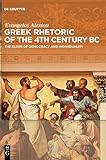Greek Rhetoric of the 4th Century BC : The Elixir of Democracy and Individuality / Evangelos Alexiou.
Material type: TextPublisher: Berlin ; Boston : De Gruyter, [2020]Copyright date: ©2020Description: 1 online resource (XVI, 361 p.)Content type:
TextPublisher: Berlin ; Boston : De Gruyter, [2020]Copyright date: ©2020Description: 1 online resource (XVI, 361 p.)Content type: - 9783110559798
- 9783110559958
- 9783110560145
- 808.00938 23/eng/20220420
- PA401 .A54 2020
- online - DeGruyter
- Issued also in print.
| Item type | Current library | Call number | URL | Status | Notes | Barcode | |
|---|---|---|---|---|---|---|---|
 eBook
eBook
|
Biblioteca "Angelicum" Pont. Univ. S.Tommaso d'Aquino Nuvola online | online - DeGruyter (Browse shelf(Opens below)) | Online access | Not for loan (Accesso limitato) | Accesso per gli utenti autorizzati / Access for authorized users | (dgr)9783110560145 |
Browsing Biblioteca "Angelicum" Pont. Univ. S.Tommaso d'Aquino shelves, Shelving location: Nuvola online Close shelf browser (Hides shelf browser)

|

|

|

|

|

|

|
||
| online - DeGruyter Kosten- und Leistungsrechnung in der Spedition : Grundlagen und praktische Anwendungen / | online - DeGruyter Die Taten des Petrus und der zwölf Apostel (NHC VI,1) : Neu herausgegeben, übersetzt und erklärt / | online - DeGruyter Adaptive Languages : An Information-Theoretic Account of Linguistic Diversity / | online - DeGruyter Greek Rhetoric of the 4th Century BC : The Elixir of Democracy and Individuality / | online - DeGruyter Intentionality and Action / | online - DeGruyter Atypical Demonstratives : Syntax, Semantics and Pragmatics / | online - DeGruyter Thomas Hobbes: De cive / |
Frontmatter -- Prologue -- Author’s Preface -- Contents -- 1. The Development of Rhetoric -- 2. Theoretical Debate concerning Rhetoric -- 3. Rhetorical Handbooks -- 4. The Canon of Attic Orators and Other Orators -- 5. Isocrates -- 6. Demosthenes -- 7. Aeschines -- 8. Isaeus -- 9. Lycurgus -- 10. Hyperides -- 11. Dinarchus -- 12. Summary - Conclusions -- Bibliography -- General Index
restricted access online access with authorization star
http://purl.org/coar/access_right/c_16ec
The interaction between orator and audience, the passions and distrust held by many concerning the predominance of one individual, but also the individual’s struggle as an advisor and political leader, these are the quintessential elements of 4th century rhetoric. As an individual personality, the orator draws strength from his audience, while the rhetorical texts mirror his own thoughts and those of his audience as part of a two-way relationship, in which individuality meets, opposes, and identifies with the masses. For the first time, this volume systematically compares minor orators with the major figures of rhetoric, Demosthenes and Isocrates, taking into account other findings as well, such as extracts of Hyperides from the Archimedes Palimpsest. Moreover, this book provides insight into the controversy surrounding the art of discourse in the rhetorical texts of Anaximenes, Aristotle, and especially of Isocrates who took up a clear stance against the philosophy of the 4th century.
Issued also in print.
Mode of access: Internet via World Wide Web.
In English.
Description based on online resource; title from PDF title page (publisher's Web site, viewed 27. Jan 2023)


